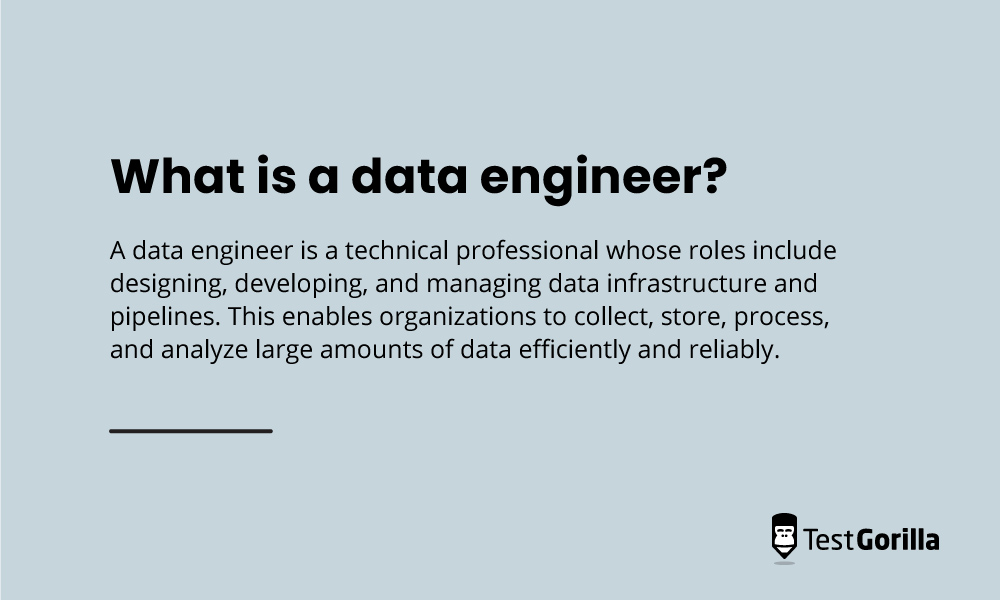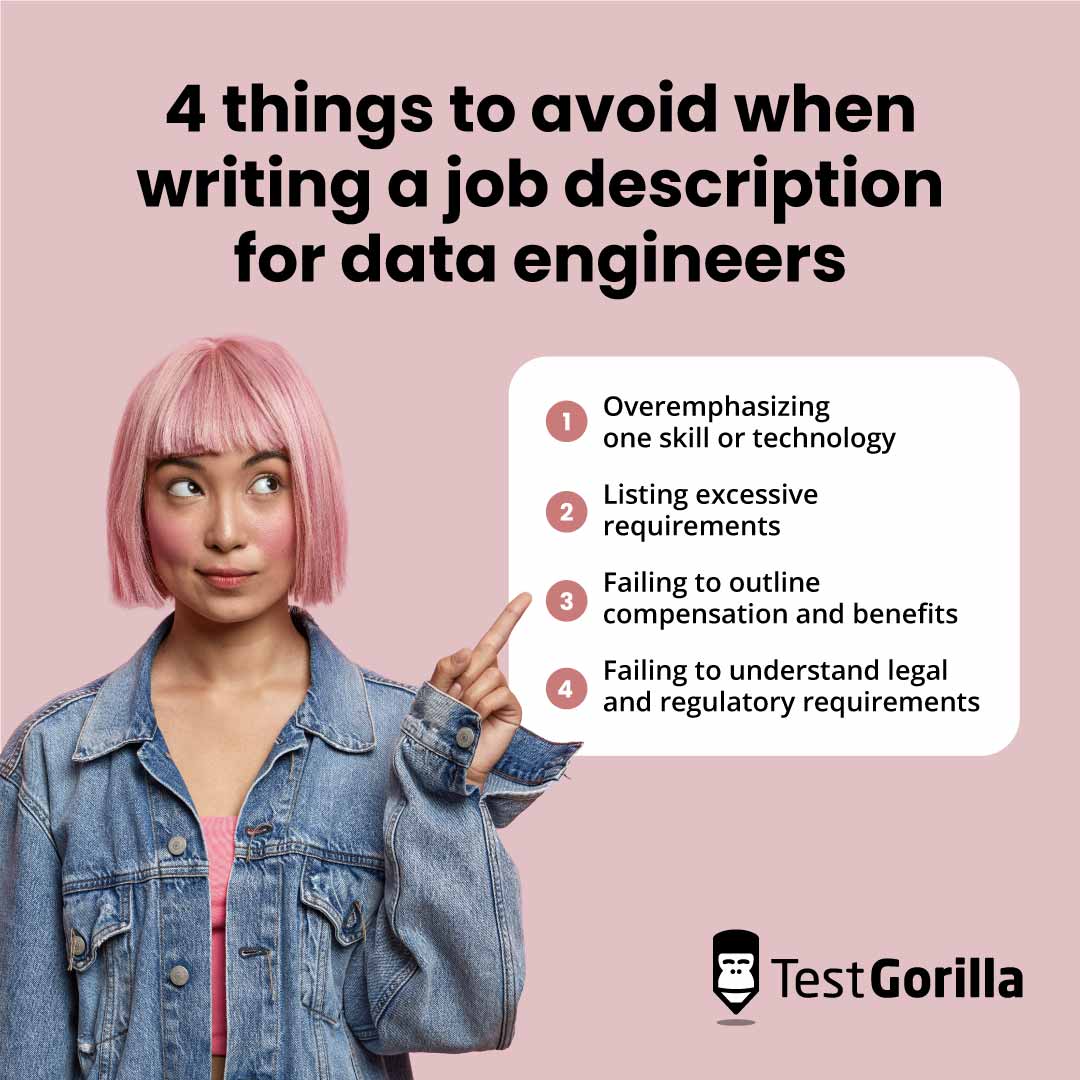Data engineers are responsible for designing and maintaining data infrastructure and pipelines within an organization. They enable you to harness the power of big data and make informed business decisions, but finding the right engineer for your position isn’t always easy.
By creating a clear data engineer job description, you can boost your chances of finding and hiring the right data engineer for your team. With an unclear or inaccurate description, you might end up with applicants who aren’t qualified – or even a lack of applications altogether.
To help you reduce the risk of this happening, we’ve put together the following comprehensive guide on writing a clear and compelling data engineer job description.
Table of contents
- What is a data engineer?
- Key skills to look for in a data engineer
- How to write an effective data engineer job description
- Data engineer job description template
- 4 things to avoid when writing a job description for data engineers
- Next steps: Attracting and assessing data engineers
- FAQs
- How TestGorilla can help you hire skilled data engineers
What is a data engineer?
A data engineer is a technical professional whose roles include designing, developing, and managing data infrastructure and pipelines. This enables organizations to collect, store, process, and analyze large amounts of data efficiently and reliably.
To perform their roles effectively, data engineers need to know various programming languages and frameworks, along with data management best practices. They can work for any company that handles large amounts of data.
Key skills to look for in a data engineer
Talented data engineers should boast a range of skills, including the following:
Proficiency in a range of programming languages, such as Python, SQL, Java, and Scala
A strong working knowledge of both relational and NoSQL database systems
Fluency in designing data models to support efficient data storage
The ability to work with cloud platforms like AWS and Google Cloud
Familiarity with extract, transform, and load (ETL) tools and frameworks
Familiarity with big data technologies, including Apache HDFS and Hadoop
Strong scripting and automation skills to streamline data workflows
A strong understanding of data and database security and security best practices
Skills for effective team collaboration with other data engineers, data scientists, and management
Strong critical thinking and problem-solving skills to identify and address potential data management issues
How to write an effective data engineer job description
Following a clear procedure when you’re writing your data engineer job descriptions will help ensure you’re including the relevant information in a clear, understandable manner.
Define your position
First, make a list of the key responsibilities and expectations for your position. This will help you understand which skills you need to look for and what information to include in your job description. Do you require a data engineer with strong all-around skills? Or do you need someone who specializes in SQL database management?
Create a draft job description
Next, create a draft job description that clearly lists key responsibilities, any required skills or qualifications, and the benefits and perks of the role. Provide a brief overview of your company culture and values to attract candidates who align with your organization.
Compare your draft to similar job postings
Compare your draft posting to competitors’ job descriptions on websites like LinkedIn. This can help you to understand what (if anything) your description is missing.
Data engineer job description template
Use the template below as a starting point for your data engineer job description.
Company introduction
Here, add a brief overview of your company. This should focus on your core values and long-term goals, along with any features or special perks that make you a standout employer.
Consider explaining why you’re looking for a data engineer and how your new hire will fit within your company.
Data engineer job brief
[Company name]
Job Title: [For example, Data Engineer, Senior Data Engineer, or Junior Data Engineer]
Reports to: [For example, Chief Data Officer, Project Manager, or Data Science Manager]
Position type: [Full-time, part-time, on-site, remote, or hybrid]
[Salary and compensation details]
Data engineer responsibilities
Develop and implement processes to collect data from a variety of sources, and ensure these processes are reliable and scalable.
Clean and process raw data so it’s suitable for analysis and reporting.
Create and deploy efficient data storage solutions, and optimize these for performance and scalability.
Develop data pipelines to automate data extraction, transformation, and loading.
Collaborate to design and maintain data models.
Implement data quality checks, and enforce governance policies and access controls to ensure data validity.
Implement industry-standard data security methods, including encryption, and ensure compliance with data privacy regulations.
Design and deploy data backup and recovery solutions.
Qualifications
Bachelor’s degree in data science, computer science, or a related field
Minimum of three years of experience in a related role
Fluency in Python and SQL
Familiarity with database management techniques
Updated knowledge of data security industry best practices
Preferred qualifications
Master’s degree in data science, computer science, or a related field
Five years’ experience in a similar role
A strong working knowledge of data modeling and analysis
Proficiency with cloud services like AWS and Google Cloud
Recommended reading: How to prepare job descriptions for a skills-based hiring approach
4 things to avoid when writing a job description for data engineers
1. Overemphasizing one skill or technology
Placing excessive emphasis on a single skill or technology can scare away attractive candidates. Data engineering requires a versatile skill set, and flexibility is crucial for adapting in a rapidly evolving field.
2. Listing excessive requirements
Listing too many required qualifications or skills is a surefire way to discourage potential candidates. Differentiate between required and preferred qualifications to show what’s a necessity and what’s not. For example, you might require a working knowledge of SQL while preferring familiarity with certain frameworks.
3. Failing to outline compensation and benefits
Data science is a very competitive field, and attracting top talent is hard enough even when you do provide attractive compensation. Be sure to outline any benefits and compensation in your job description to help you draw in and retain the interest of talented candidates. These could include health insurance, dental insurance, or gym memberships.
4. Failing to understand legal and regulatory requirements
It’s crucial to understand your legal and regulatory requirements when hiring a data engineer to avoid trouble. You’ll need to check out your local labor regulations and ensure you avoid discriminating against or excluding specific demographics. For example, this can be considered age discriminatory: “Looking for a young data engineer to join our dynamic team.”
Next steps: Attracting and assessing data engineers
Once you’ve got your data engineer job description written up and ready to go, you’ll need to post it on relevant job boards and other locations to attract qualified candidates.
Using a pre-employment testing platform like TestGorilla is a great way to identify the strongest applicants. It can help you avoid the unconscious hiring bias that comes from assessing candidates based on interviews or resumes alone.
TestGorilla offers a wide range of tests you can use alongside custom data engineer questions to create an applicant screening assessment. These include a Data Modeling Concepts test and a Python (Coding): Data Structures & Objects test.
Combine these job-specific tests with personality tests and custom data engineer interview questions for best results.
FAQs
How much experience should I require in my data engineer job description?
It’s up to you to decide how much experience is required for your data engineer position. Companies with strong core teams may be willing to hire high-potential candidates with limited experience. On the other hand, you’ll need to look for someone with at least three years of experience for senior-level positions.
Should I include a bachelor’s degree requirement?
Although some companies prefer candidates to have a bachelor’s degree in a relevant field, it’s not an absolute requirement. Numerous coding bootcamps and professional courses provide high-quality, real-world training. The programs might not offer formal degrees, but graduates can earn certifications or digital badges as evidence of their new skills. To widen your candidate pool, encourage candidates without formal degrees but with relevant training or experience to apply.
What salary should I offer in my data engineer job description?
According to Indeed.com, the average base salary for a data engineer in the US is $123,307/year. This value fluctuates depending on the engineer’s experience, position, and responsibilities.
How TestGorilla can help you hire skilled data engineers
Creating a high-quality data engineer job description is just the first part of the hiring process.
After you’ve attracted candidates, TestGorilla can help you assess and manage them in a smooth, efficient manner. Our test library contains 300+ soft and hard-skills tests, along with personality tests.
Sign up for a free account, check out our product tour, or book a free 30-minute demo to learn more about how TestGorilla can help your business.
Related posts
Hire the best candidates with TestGorilla
Create pre-employment assessments in minutes to screen candidates, save time, and hire the best talent.
Latest posts
The best advice in pre-employment testing, in your inbox.
No spam. Unsubscribe at any time.

Hire the best. No bias. No stress.
Our screening tests identify the best candidates and make your hiring decisions faster, easier, and bias-free.
Free resources
This checklist covers key features you should look for when choosing a skills testing platform
This resource will help you develop an onboarding checklist for new hires.
How to assess your candidates' attention to detail.
Learn how to get human resources certified through HRCI or SHRM.
Learn how you can improve the level of talent at your company.
Learn how CapitalT reduced hiring bias with online skills assessments.
Learn how to make the resume process more efficient and more effective.
Improve your hiring strategy with these 7 critical recruitment metrics.
Learn how Sukhi decreased time spent reviewing resumes by 83%!
Hire more efficiently with these hacks that 99% of recruiters aren't using.
Make a business case for diversity and inclusion initiatives with this data.





















